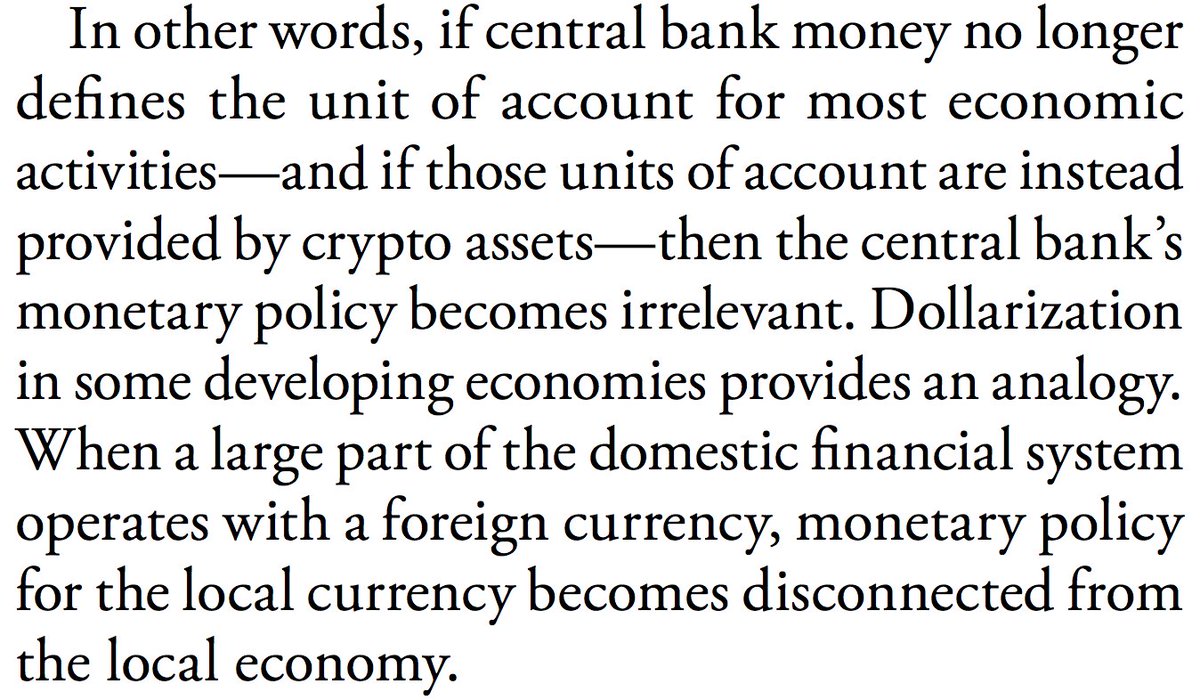"Monetary Policy in the Digital Age. Crypto assets may one day reduce demand for central bank money."
Dat subtitle tho...
$BTC $ETH
imf.org/external/pubs/…
- Crypto has rekindled the debate about whether advances in IT can render central banks obsolete
- Author: "To fend off potential competitive pressure from crypto assets, central banks must continue to carry out effective monetary policies"
Whaaat!?
- For now, crypto assets are too volatile and risky to pose a threat to fiat
- And they do not enjoy the same degree of trust that citizens have in fiat
- However, continued innovation and longer track records may reduce volatility and boost adoption
- Limited supply cryptos lack 3 functions that stable monetary regimes fulfill:
1. Protection against risk of structural deflation
2. Ability to respond flexibly to temporary shocks to money demand
3. The capacity to function as a lender of last resort
$BTC bulls?
- Offers anonymity of cash while allowing tx across long distances
- Unit of tx is more divisible
- Unlike bank transfers, tx can be cleared and settled quickly w/out an intermediary slashing time for cross-border payments from days to seconds
- Crypto may usher shift from account-based to value-based payments
- In account-based sys, transfer of claims is recorded in an account w/ trusted
intermediary (eg bank)
- value-based sys involve transfer of a payment object such as a commodity w/out trust
- This may usher in change in how money ($) is created: from credit $ to commodity $
- Today, $ is based on credit relationships: central bank $ is a credit relationship b/w central bank and citizens (cash) and b/w central bank and commercial banks (reserves)
- Commercial bank $ (demand deposits) is a credit relationship b/w bank and its customers
- Crypto assets are not based on credit relationships, are not liabilities of any entities, and thus more like commodity $
- Historically, we have alternated b/w credit and commodity $
- "If crypto leads to a more prominent role for commodity $, the demand for central bank $ is likely to decline"
- Central banks conduct $ policy by setting short-term interest rates in the interbank market for reserves (or clearing balances they keep w/ the central bank)
- Ceasing to be the monopoly supplier of such reserves would deprive central banks of their ability to carry out monetary policy
- "Would the central bank need to buy and sell a lot of crypto assets to move interest rates in a crypto world?"
- Or one step further: how much would central banks’ monetary policies even matter?
- If central bank $ no longer defines the UoA for most economic activities—and if those UoA are instead provided by crypto assets—then the central bank’s monetary policy becomes irrelevant
1. Continue to strive to make fiat currencies better and more stable UoA
- Improve economic forecasts by making use of big data, AI, and machine learning
2. Authorities should regulate crypto to prevent regulatory arbitrage and unfair competitive advantage due to lighter regulation
- That means rigorous AML, preventing financing of terrorism, strengthening consumer protection, and effectively taxing crypto tx
3. Central banks should continue to make their money attractive for use as a settlement vehicle
- Eg issue digital tokens of their own to supplement physical cash and bank reserves
In short, the author seems to argue that the threat is real and that central banks need to issue digital $:
"Central bank digital $ could help counter the monopoly power that strong network externalities can confer on private payment networks"
Eg network effects is a bitch
"Central banks must maintain the public’s trust in fiat currencies and stay in the game in a digital, sharing, and decentralized service economy. They can remain
relevant by providing more stable UoA than crypto and by making central bank $ attractive as a MOE."


